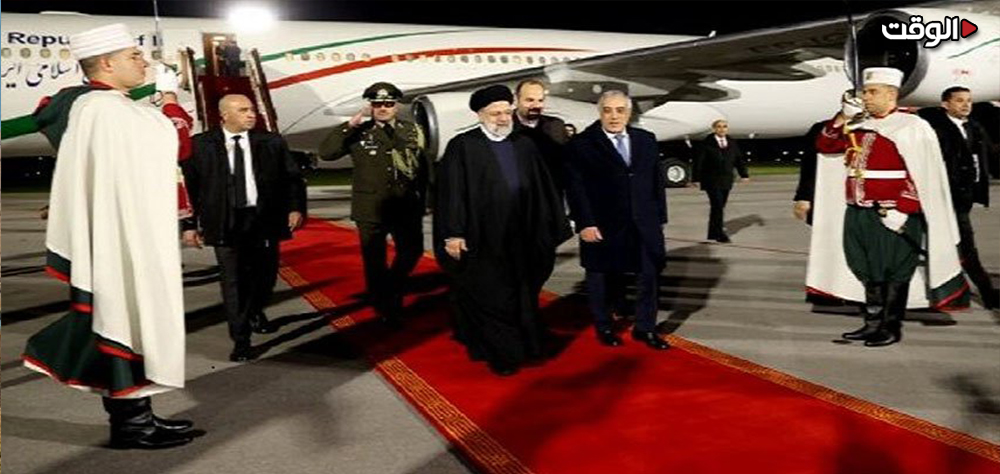Algeria endeavors to establish ties with the Eastern Front and capitalize on these opportunities for its own enhancement. It endeavors to oppose the coalition formed by Western powers and their growing engagement with the Zionist regime, which has facilitated the regime's intervention in North African affairs.
ALWAGHT- Iranian President Seyyed Ebrahim Raeisi, accompanied by a distinguished economic and political delegation, journeyed to the Algerian capital on Saturday following an official invitation extended by President Abdelmadjid Tebboune. The purpose of their visit was to participate in the 7th Summit of the Gas Exporting Countries Forum (GECF).
Raeisi's recent diplomatic mission to Zimbabwe, Uganda, and Kenya in July of this year yielded comprehensive agreements with these nations. While forging relations with Africa offers Iran substantial economic prospects, recent developments such as South Africa's condemnation of the Zionist regime and the unwavering support of African countries for the Palestinian cause signal a pivotal juncture in these ties. This situation presents opportunities for bolstering Iran's influence and soft power in this resource-rich and promising continent.
Iran boasts one of the world's largest natural gas reserves and an extensive network of over 338,000 kilometers of domestic gas pipelines, positioning it as a frontrunner in this domain. Leveraging its geopolitical standing, Iran could emerge as the preferred conduit for gas transmission to both Eastern and Western regions. Principal members of the Gas Exporting Countries Forum include Algeria, Bolivia, Egypt, Equatorial Guinea, Iran, Libya, Nigeria, Qatar, Russia, Trinidad and Tobago, the United Arab Emirates, and Venezuela, while observer members comprise Angola, Azerbaijan, Iraq, Malaysia, Mauritania, Mozambique, and Peru.
The analytical platform "ALWAGHT" engaged in a detailed discussion with Africa expert Yasser Kanani to delve into the intricacies of the president's African tour and explore the economic and political dimensions of the Gas Exporting Countries Forum summit.
The Africa specialist highlighted the importance of the president's trip to Algeria, particularly focusing on its economic aspect: Visits by heads of state to different nations always carry weight in regional and global diplomacy. The Gas Exporting Countries Summit, hosted in Algeria, holds notable significance. Iran, recognized as a significant gas exporter alongside Algeria in North Africa, possesses substantial and strategic gas reserves. Thus, this visit presents an opportunity for both nations to explore common interests and strategies for resource management.
Kanani views Qatar as a competitor and notes that gas-exporting countries generally aim to reduce reliance on fossil fuels, with gas serving as a vital resource. Additionally, Algeria's proximity to European countries has historically made it a key supplier of gas resources to these nations, underlining its importance in the sector.
He underscored Africa's stance on Palestinian developments and the alignment of policies between Iran and African countries. He remarked that since the Islamic Revolution, Iran has cultivated strategic ties with Algeria. Similar to the Pahlavi era's alignment with Western monarchies, after the revolution, Algeria has become an ally of Iran in various political arenas. This partnership has remained steadfast in international forums and global issues, especially in recent events concerning Palestine and Gaza, where both nations share congruent perspectives and positions.
According to the Africa specialist, the enduring historical ties between Iran and Algeria have always held significance, and there's an expectation of a fresh surge and progress across various domains between the two nations. "The economic committees of both countries are anticipated to intensify their activities, offering opportunities to leverage Algeria's economic and political capacities."
Kanani asserts that this journey presents an opportunity, provided we engage with Algeria based on a structured plan. Algeria, alongside South Africa, stands as a pivotal and influential nation within the African Union. Iran shares a notable history with the Algerian government concerning the Western Sahara and support for freedom movements in Africa, underscoring the mutual nature of this friendship.
The expert highlighted the waning French influence in Algeria, stating: In Africa, French colonialism has diminished France's historical sway on the continent. Algeria seeks to establish ties with the Eastern Front, aiming to bolster itself through these engagements. It contends against the Western powers' front, which has facilitated the Zionist regime's entanglement in North Africa. Algeria seeks to fill this vacuum and position itself as a new force in the African region. Algeria has weathered various economic crises and witnessed multiple governmental changes.
Kanani, in another segment of his remarks, underscored the shared commitment of Tehran and Algiers to bolster comprehensive relations: Both capitals have pledged to synchronize politically on an international scale. It's crucial to outline strategies and roadmaps for collaborative efforts across various sectors, with both short and long-term planning focusing on Africa. Within the framework of these extensive relations, Iran can implement its strategy effectively. Despite the investments made by various governments in the gas sector, Algeria, in my opinion, possesses significant infrastructure, expertise, and a successful track record in gas exploration and export, distinguishing it from other nations. This presents Algeria with an ongoing opportunity to adopt more structured and comprehensive policies regarding the Gas Exporting Countries Forum. Additionally, Algeria maintains favorable relations with other Arab states like Qatar.
In conclusion, he remarked: This summit is poised to significantly increase opportunities for interaction. However, until the summit statement and objectives are officially released, a precise analysis cannot be provided. Nevertheless, it's worth noting that the issue of gas and energy in North Africa has long been of interest to Western and European nations, which are linked to North Africa through the Mediterranean Sea. Europe has consistently sought access to sustainable energy resources through this corridor.



























